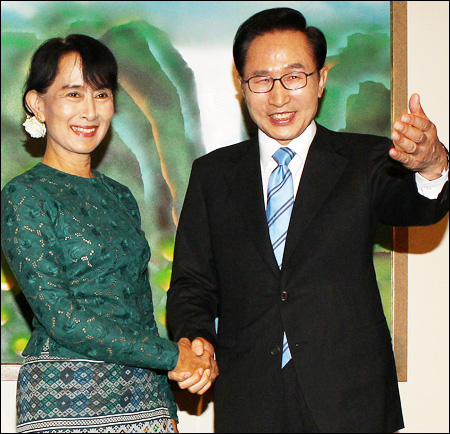
Lee vows to help Myanmar’s democracy

Lee Myung-bak said Tuesday South Korea is ready to help Myanmar’s journey to democracy and prosperity after he met with Aung San Suu Kyi, a symbol of freedom in the reforming Southeast Asian country.
“The Republic of Korea is a country that achieved both industrialization and more importantly, democratization together,” Lee said during a joint press conference with Suu Kyi in Yangon. “The people of South Korea will pay deep attention so as to help Myanmar.”
Suu Kyi agreed with Lee that economic gains should not be made at the expense of freedom.
“We want justice and freedom and we want prosperity. Not either of it but all of it together. President Lee understands perfectly that prosperity is no substitute for democracy,” she said.
Earlier, a Cheong Wa Dae spokesperson said Myanmar has pledged to comply with U.N. resolutions on North Korea’s weapons programs during Lee’s summit Monday with President Thein Sein on Monday in Naypyidaw.
After meeting Suu Kyi, Lee visited a cemetery where 29 years ago a North Korean terrorist bombing killed 17 South Koreans.
Suu Kyi, recently elected to parliament, has acted as the rallying point of Myanmar’s democracy movement despite repeated house arrest by military rulers. She was last released in late 2010.
A Cheong Wa Dae official added that Myanmar agreed to free a North Korean refugee who had been imprisoned since 2010 for illegally crossing the border.
Myanmar and the North are a study in contrasts as the international community has begun to embrace the former’s democratic reforms while Pyongyang faces increasing isolation over its nuclear weapons program.
In 1983, South Korean President Chun Doo-hwan narrowly missed the terrorist plot as he left his hotel three minutes later than scheduled.
The Burmese government severed ties with Pyongyang after the incident but reinstated relations in 2007. Previously, Myanmar had been under fire for weapons proliferation and reportedly making illicit arms deals with the North.
The U.N. Security Council last month expanded sanctions on Pyongyang in response to its failed April 13 long-range rocket launch that was seen as a ballistic missile test. It has also sternly warned Pyongyang against future provocations including a speculated third nuclear test. U.N. resolutions bar weapons exports by Pyongyang.
During their meeting, Lee and Sein agreed to expand cooperation in energy, resources and trade. Seoul also agreed to share its development experience with the long-isolated country.
Since April last year, Sein has taken steps towards reform including the release of political prisoners and cease-fires with ethnic groups and economic reforms prompting a positive international response to the resource-rich nation.
In January, U.S. Secretary of State Hillary Clinton said the United States was ready to start the process of exchanging ambassadors with Myanmar.
Lee’s trip was seen as an effort to reach out to an underdeveloped nation seen to have significant growth potential. The country has one of the world’s largest natural gas reserves and large deposits of mineral resources.
Still analysts said the visit could send a message to North Korea.
“It does serve as a reminder to Pyongyang that there is another path they can take,” Peter Beck, the Asia Foundation’s Country Representative in Korea, said.
“A year ago this was one of the most hopeless dictatorships in the world. In the span of year we’ve seen this transformation. It’s an explicit reminder of what North Korea is missing out on.” <Korea Times/Kim Young-jin>


